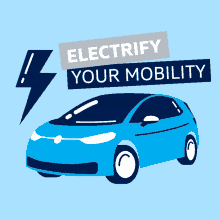ENVIRONMENT
01 NOVEMBER 2021
What Should Be Done To Increase The Number Of Electric Vehicles/cars Across Western Balkan Roads?
Author: Rilind Dauti, North Macedonia
In Western Balkan countries, the average age of vehicles in circulation is up to 20 years. This disappointing fact should come as no surprise, given the citizens’ low standard of living, making them unable to save money to purchase a new vehicle. Instead, the average Balkan citizen drives a barely moving vehicle that consumes large amounts of gas, has frequent breakdowns, and pollutes the environment.
However, the financial capacity is not the sole reason behind this meagre state-of-affairs of the vehicle fleet across Western Balkan roads. Another reason is the lack of operating leasing culture as one of the ways in which individuals may obtain a new vehicle.
Operating leasing permits the use of a new vehicle but does not convey ownership rights thereof. At first, this would seem like an unacceptable offer, but it offers more advantages than disadvantages, given the fact that one would not actually own the vehicle. Specifically, an operating lease is the best way to regularly drive a new vehicle. It anticipates payment of a certain amount at the contract’s start date, and a fee for every month of the anticipated vehicle use period (most commonly 36 months). At the end, depending on the country, the client is offered to return the vehicle, to extend the lease or to purchase the vehicle at reduced price stemming from the fact that it has been used for several years.
The initial fee to be paid at the beginning of the lease amounts from 1500 to 3000 EUR, whereby the monthly installment may often amount to less than 300 EUR.
Initially, the operating lease may seem to be a costly solution. However, the price of an old/used “runabout” may amount to over 4000 EUR (easily exceeding the initial operating lease amount). What is more, that runabout will later incur higher fuel and repair costs. A new car, despite incurring a fee of several hundred euros per month, largely compensates for that cost with fuel and repair savings. Even if there is a need of repairs, the leasing companies would repair the vehicle free of charge because the vehicle is under warranty!
Surprisingly enough, vehicle importers do not advertise operating leasing at all. Even when one ultimately finds this option on their websites, there is lack of data with specifics about the cost of a certain vehicle if used under operating lease.
But these clever actions (?) taken by new vehicle importers would inevitably have to end. Nobody can force them to change this approach, except the state, which holds the monopoly of enforcement. This may be resolved by adopting or amending a law. When a vehicle price is advertised, the price should be determined by including the calculation of the lowest price for using the car by means of operating lease, for example for a standard period of 36 months.
What the state should do is introduce a ban on importing fuel powered vehicles (including plug-in hybrids) and to allow import of only 100% electric vehicles. The optimal year to introduce this ban is 2025. By then, the price of electric vehicles will decrease and will reach the price of classic vehicles, and all vehicle manufacturers will offer electric cars. Thus, none of the Western Balkan importers would have grounds to complain by saying they are forced to cease their business operations.
By banning sales of fuel-powered cars, Western Balkan countries would reach what is known as technological leapfrogging. What does this mean? As opposed to western countries who are constantly raising the standards for fuel-powered cars, Western Balkan countries would leap directly to using electric vehicles/cars!
Lastly, perhaps the most important step that Western Balkan governments should take is to introduce vouchers for procurement or utilization of electric vehicles by means of operating lease. A 2000-3000 EUR voucher would make tremendous difference, because it may be used for the initial cost. Citizens would then have to cover only the monthly fee, whereby, as previously mentioned, portion of that cost would be compensated by fuel and repair savings. On the other hand, costs for a new and electric car are much lower as opposed to old used cars that consume large amounts of fuel.
To conclude, it is often stated that electric cars are not as clean as we think, given the fact that their batteries are charged by electricity produced by coal-fired power plants. This may seem particularly problematic for the Western Balkans, where many such power plants are still operational. But this should not scare us. Notably, even if one electric car has a battery powered by electricity generated by thermal coal, it is still more environmentally friendly than the equivalent car that consumes diesel or gasoline. In addition, electric cars do not emit gases other than carbon dioxide, making them completely harmless to the air, unlike fuels that also pollute with nitrogen oxides (NOx) and harmful particles such as PM10.


 Information technology
Information technology
 Environment
Environment











Leave a Reply
Want to join the discussion?Feel free to contribute!